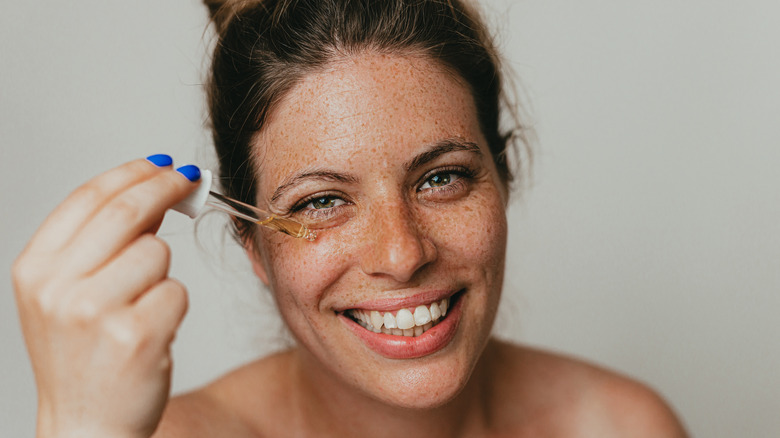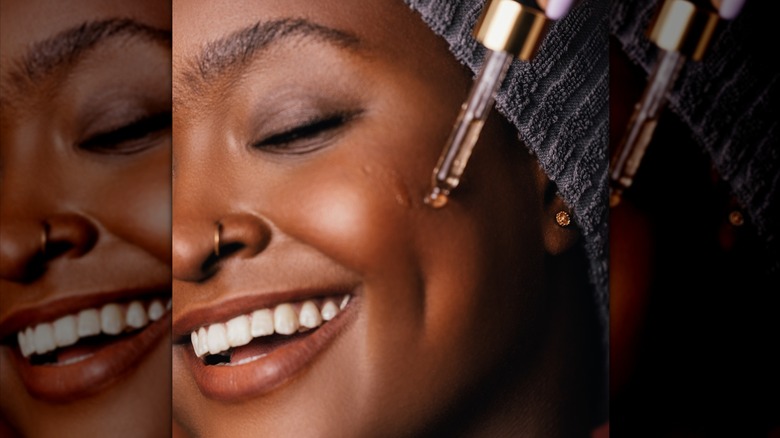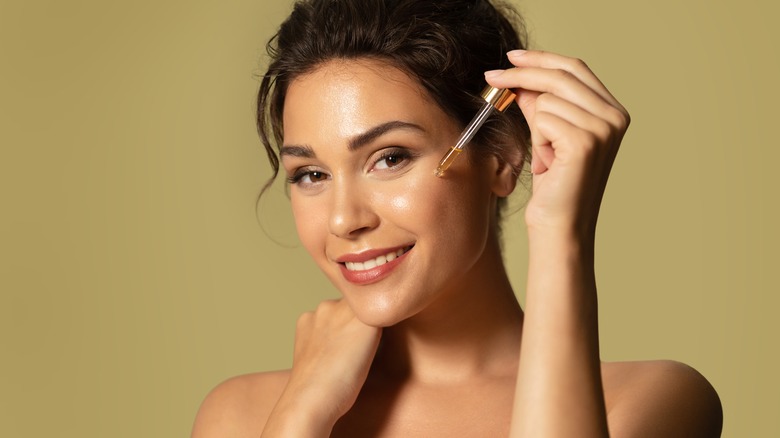CoQ10 Is The Antioxidant That Should Be On Your Skincare Radar
CoQ10, also called coenzyme Q or ubiquinone, is a naturally occurring antioxidant that exists in every cell of our bodies, made in the mitochondria (you know, the powerhouse of the cell). It assists in energy production in our cells, and with our skin cells, this specifically means that CoQ10 shields skin from damage due to free radicals, sun exposure, and environmental stressors. CoQ10 repairs injured fibers in the skin and protects collagen and elastin.
In younger days, our cells produce as much CoQ10 as we need, but production diminishes pretty early on in adulthood. Cosmetic chemist Vanessa Thomas told Byrdie, "Coenzyme Q10 in humans begins at low levels when we are young, peaks in our late teens, and begins to decline after 20 years of age." For this reason, dermatologists recommend that people start using CoQ10 at about 20 years old and continue with the antioxidant for years to come.
While CoQ10 has been a mainstay in Japanese beauty products, the concept is a relatively new one in other parts of the world, in spite of the fact that the compound occurs naturally in our bodies. Its increased popularity means that it's becoming easier to find in skincare products, including eye creams. Since body care is having a huge moment, body lotions and moisturizers are also boosting their efficacy by adding CoQ10. With the superstar antioxidant cropping up everywhere, it's worth knowing what CoQ10 can do for your skin.
What CoQ10 does for your skin
CoQ10 does a number of things for your skin when applied via toner, moisturizer, or serum. Since it aids in the cell's energy production, CoQ10 helps keep cells active by enhancing the production of collagen and elastin and fighting free radicals. In contrast, sluggish skin cells show signs of aging, like discolouration and wrinkles, faster. The antioxidant also helps with repairing sun damage. "The potent antioxidant function of CoQ10 helps it to protect the skin at the molecular level from the damaging effects of the sun and from damage by free radicals," HiQ Cosmetics founder Patrick Pickens told Byrdie.
CoQ10 is also capable of evening out skin tone, and can fade dark spots as well as prevent future discolouration from forming. Essentially, CoQ10 helps cellular energy production, so skin cells are able to effectively fight off free radicals, produce collagen and elastin, and utilize the nutrients they need so that they can function at an optimal level. A study published in Biofactors found that two weeks of a topical application of CoQ10 showed that all subjects had much higher levels of antioxidant effects in the skin, and that the compound increased the metabolic production of cells. This means that CoQ10 was an effective remedy to replenish the lost antioxidants due to aging cells. Use CoQ10 with other antioxidants to boost their effect; maybe apply it after a retinol. It's often found with vitamins C, E, and B3s, so it plays well with others.
Why give CoQ10 a chance?
CoQ10 is still new to the mainstream skincare world, and so more research is required. However, its benefits have been overwhelmingly positive so far. Because it naturally occurs in the body, it tends to be safe for everyone, and is particularly effective as skin ages. In terms of topical treatments, people with vitiligo should steer clear of this antioxidant. "CoQ10 has been shown to block an enzyme known as tyrosinase, which is necessary for creating pigment," dermatologist Shereene Idriss, MD told Byrdie. "By blocking it, it may lead to worsening of depigmentation in those who suffer from vitiligo."
Besides that, topical CoQ10 is easy to use and very effective. Board-certified dermatologist Dr. Rachel Nazarian told The Zoe Report that "[CoQ10 is] best used one to two times a day, preferably under sunscreen each morning, to preserve skin as it's exposed to the multitude of daily offenses."
The antioxidant is also popular in supplement form. A study published in Biofactors found that subjects who ingested between 50 and 150 mg of CoQ10 for 12 weeks showed considerable improvement in skin smoothness, as well as a reduction in fine lines and wrinkles. So you can take it orally as a supplement as well. If you're planning on taking the oral supplement, note that it can interfere with some cardiac medications, so ask your physician if oral supplements would be compatible with your overall health.


